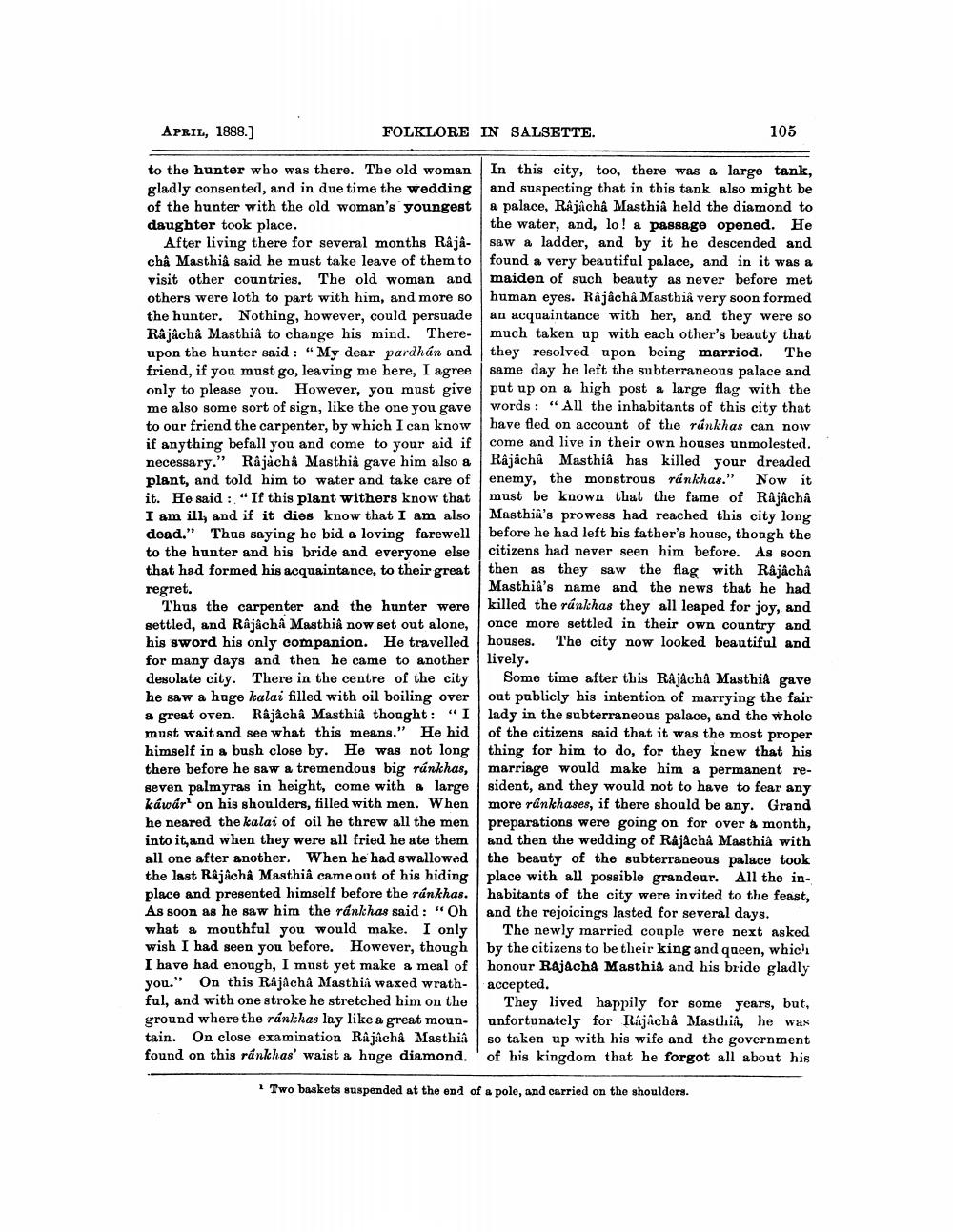________________
APRIL, 1888.]
to the hunter who was there. The old woman gladly consented, and in due time the wedding of the hunter with the old woman's youngest daughter took place.
After living there for several months Râjâchâ Masthiâ said he must take leave of them to visit other countries. The old woman and others were loth to part with him, and more so the hunter. Nothing, however, could persuade Rajâchâ Masthiâ to change his mind. Thereupon the hunter said: "My dear pardhan and friend, if you must go, leaving me here, I agree only to please you. However, you must give me also some sort of sign, like the one you gave to our friend the carpenter, by which I can know if anything befall you and come to your aid if necessary." Râjachâ Masthiâ gave him also a plant, and told him to water and take care of it. He said: "If this plant withers know that I am ill, and if it dies know that I am also dead." Thus saying he bid a loving farewell to the hunter and his bride and everyone else that had formed his acquaintance, to their great regret.
FOLKLORE IN SALSETTE.
Thus the carpenter and the hunter were settled, and Râjâchâ Masthiâ now set out alone, his sword his only companion. He travelled for many days and then he came to another desolate city. There in the centre of the city he saw a huge kalai filled with oil boiling over a great oven. Râjâchâ Masthia thought: "I must wait and see what this means." He hid himself in a bush close by. He was not long there before he saw a tremendous big rúnkhas, seven palmyras in height, come with a large káwar on his shoulders, filled with men. When he neared the kalai of oil he threw all the men into it, and when they were all fried he ate them all one after another. When he had swallowed the last Rajâchâ Masthiâ came out of his hiding place and presented himself before the rúnkhas. As soon as he saw him the rankhas said: "Oh what a mouthful you would make. I only wish I had seen you before. However, though I have had enough, I must yet make a meal of you." On this Rajâchâ Masthia waxed wrathful, and with one stroke he stretched him on the ground where the rankhas lay like a great mountain. On close examination Râjâchâ Masthia found on this rankhas' waist a huge diamond.
105
In this city, too, there was a large tank, and suspecting that in this tank also might be a palace, Râjâchâ Masthiâ held the diamond to the water, and, lo! a passage opened. He saw a ladder, and by it he descended and found a very beautiful palace, and in it was a maiden of such beauty as never before met human eyes. Râjâchâ Masthiâ very soon formed an acquaintance with her, and they were so much taken up with each other's beauty that they resolved upon being married. The same day he left the subterraneous palace and put up on a high post a large flag with the words: "All the inhabitants of this city that have fled on account of the rankhas can now come and live in their own houses unmolested. Râjâchâ Masthiâ has killed your dreaded enemy, the monstrous rankhas." Now it must be known that the fame of Rajâchâ Masthia's prowess had reached this city long before he had left his father's house, though the citizens had never seen him before. As soon then as they saw the flag with Râjâchâ Masthia's name and the news that he had killed the rúnkhas they all leaped for joy, and once more settled in their own country and houses. The city now looked beautiful and lively.
Some time after this Râjâchâ Masthia gave out publicly his intention of marrying the fair lady in the subterraneous palace, and the whole of the citizens said that it was the most proper thing for him to do, for they knew that his marriage would make him a permanent resident, and they would not to have to fear any more rankhases, if there should be any. Grand preparations were going on for over a month, and then the wedding of Râjâchâ Masthia with the beauty of the subterraneous palace took place with all possible grandeur. All the inhabitants of the city were invited to the feast, and the rejoicings lasted for several days.
The newly married couple were next asked by the citizens to be their king and queen, which honour Rajacha Masthia and his bride gladly accepted.
They lived happily for some years, but, unfortunately for Rajâchâ Masthiâ, he was so taken up with his wife and the government of his kingdom that he forgot all about his
1 Two baskets suspended at the end of a pole, and carried on the shoulders.




